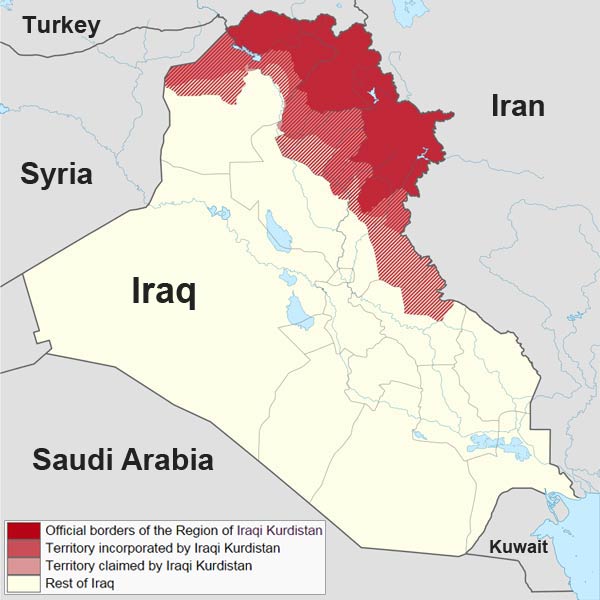June 16, 2017

Iran has joined Iraq, Turkey, the United States and Germany in voicing opposition to any such referendum.
The referendum will not result in instant independence, Kurdish officials said, but will simply start the process for negotiating Kurdistan’s eventual separation from Iraq.
Often described as the world’s largest stateless people after being denied their own country in the wake of World War I, Kurds are spread among Iran, Iraq, Syria and Turkey.
The decision to set the date for September 25 was made at a meeting attended by Kurdish leader Massud Barzani and representatives of the region’s political parties, the presidency said in a statement.
“It will be on that day when the people of the Kurdistan region, as well as those living in the disputed areas, will cast their votes on whether they accept independence,” it declared. The term “disputed areas” meant the Kurdish government will also accept voting in areas their troops have occupied as part of their efforts to push back the Islamic State and not just in the three Iraqi provinces recognized as constituting Iraqi Kurdistan.
The presidency’s statement said in Kurdish the referendum would include “areas of Kurdistan outside the administration of the region,” which were termed “disputed areas” in English.
This refers to swathes of northern territory that are claimed by both Kurdistan and Baghdad, including the key oil-rich area around Kirkuk.
Opposition in Baghdad to Iraqi Kurdistan becoming independent would become even greater if the region tried to take disputed territory along with it.
Hoshyar Zabari, a senior Kurdish politician, said the referendum would be held in disputed territories only if locally elected councils chose to join the process.
Iraqi Kurdistan, like the rest of the country, depends almost entirely on revenue from crude oil sales to provide government funds.
Kurdistan exports most of its oil via a pipeline leading to the Turkish port of Ceyhan, but also overland through Turkey by tanker truck.
Potential opposition from Turkey could thus pose a major economic as well as political challenge to Iraqi Kurdish independence.
Turkey has a large Kurdish minority with which the government has been engaged in a multi-decade armed conflict, and Ankara would likely fear that Iraqi Kurdish independence could fuel increased calls for a similar move within its territory.
Iran and Syria — which also have large Kurdish populations — also have similar concerns.
But due to how Iraqi Kurdistan exports oil, Turkey potentially has both an effective veto over independence in general, and a ready means to apply huge pressure to the fledgling state’s economy, if it did split from Iraq.
Internally, Iraqi Kurdistan has been hit hard by low oil prices to the point that it has stopped paying some government employees for extended periods.
And while the concept of Kurdish independence has broad appeal, Iraqi Kurds are deeply divided politically, which could lead to paralysis in a new state.
The regional presidency’s statement said that “the political parties … agreed to resolve some of the outstanding political and economic issues prior to the date of the referendum.” But it didn’t say how they were to be resolved and how they could be resolved in a matter of weeks after years of disputation.
Nechirvan Barzani, the region’s prime minister who is the nephew of its leader, had previously said the Kurds would address the issue of independence with Baghdad after the conclusion of the operation to retake Mosul from the Islamic State group.
If the Kurdish areas do secede from Iraq, the rump state will approach being three-fourths Shia. That could drive the rump state even more into the arms of the Islamic Republic and promote even deeper frictions with Iraqi Sunnis and with neighboring Sunni states.
Iranian Foreign Ministry spokesman Bahram Qasemi did not react until three days after the Kurdish announcement. He then said, “The Kurdistan region is part of the Iraqi republic and unilateral decisions outside the national and legal framework, especially the Iraqi constitution, Ö can only lead to new problems.”
About 8 million or 10 percent of the population of Iran is Kurdish.
Turkey called the referendum “a terrible mistake.”
The US State Department said it supports a “unified, federal, stable and democratic Iraq” and was concerned that the referendum would distract from “more urgent priorities,” like the defeat of the Islamic State.
The first reaction came from Germany, which has about 130 troops in Iraqi Kurdistan providing training for Kurdish forces. Foreign Minister Sigmar Gabriel said, “We can only warn against one-sided steps on this issue. The unity of Iraq is on the line. Redrawing the lines of the state is not the right way and could exacerbate an already difficult and unstable situation, in Erbil as well as in Baghdad.”
